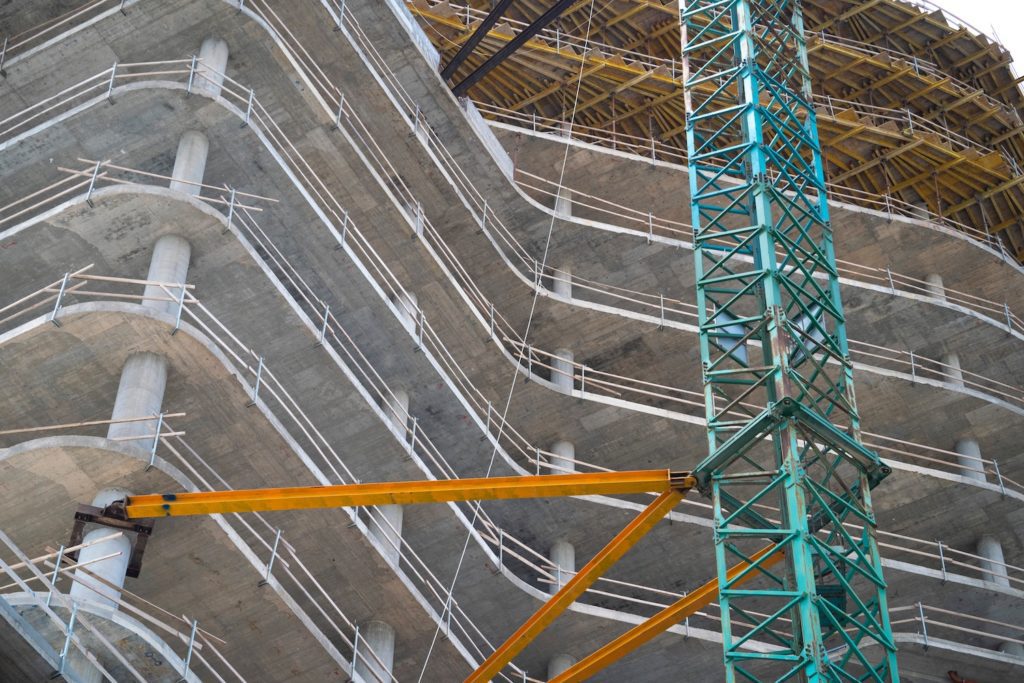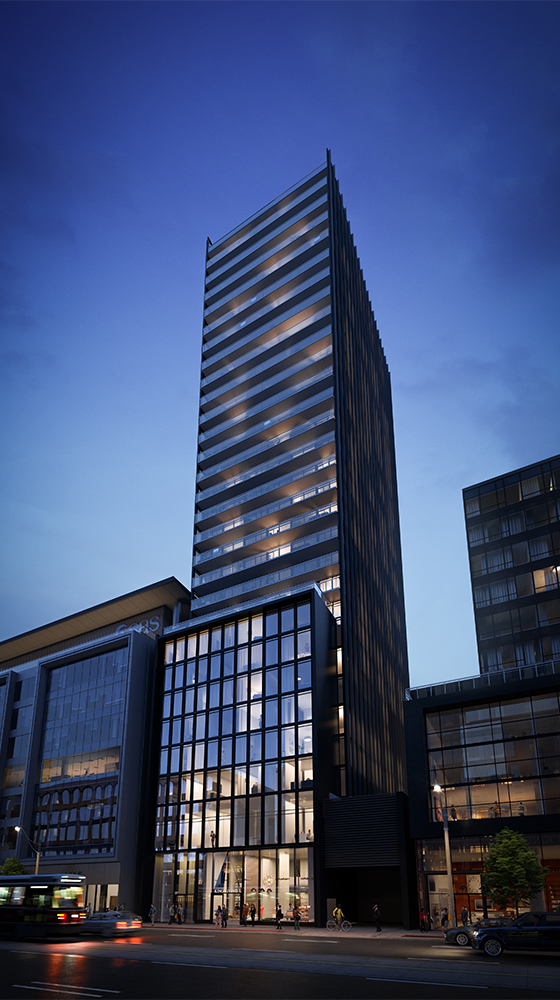
12.9.2021
10 Things To Know About Buying Pre-Construction Condos
Pre-Construction
In bustling metropolitan cities like Toronto, the market for pre-construction condos seems to never slow down, and it’s easy to see why they’re such hot commodities.
With an ever-expanding downtown core and a perennially increasing population, the need for new homes is ever-present across every level of Toronto’s housing market. And, seeing as pre-construction condos have the added allure of being modern and brand-new, they often score high marks in terms of desirability among prospective condo buyers.
With that in mind, the process of purchasing a pre-construction condo isn’t exactly the same as traditional resale real estate transactions. So, if you’ve been considering buying a pre-construction condo in the near future, here are a few things you should know about how to go about it.
1. Understand How HST Works
If you’re an Ontario resident (or are from most provinces along Canada’s east coast), you should already know all about the Harmonized Sales Tax (HST) — but did you know that HST also applies to purchases of pre-construction condos?
Unlike traditional resale real estate transactions where the Title of a home transfers hands between individual owners, when you purchase a pre-construction condo unit from brand-new, you’re required to pay HST on top of the purchase price.
This will happen one of two ways:
- You pay the HST amount with cash-in-hand at the time of closing
- You pay the HST amount via your mortgage
Should the pre-construction condo developer include the HST in the overall purchase price of the unit, then you will most likely follow option “b”. If the overall purchase price of the unit indicates “+ HST”, then you will need to follow option “a”.
2. Understand How The HST Rebate Works
The good news is, most pre-construction condo buyers are eligible for a refund on their HST — this is called the HST Rebate. Whether you plan on living in the pre-construction condo yourself or plan on renting it out as an income property, there’s a good chance you can earn your HST payment back by applying for the rebate.
If you plan on living in the unit for at least one year after it becomes move-in ready, you need to apply for what’s called the New Home Rebate (NHR).
In most cases, developers will have already factored the HST Rebate into their pricing for the unit. If they haven’t factored that cost into their pricing already (i.e. the “+ HST” scenario), then the NHR will eventually recoup the funds for you.
3. The NRRP Rebate
Should you plan on renting out your pre-construction condo to a tenant as an income property, the process of earning your HST back will go slightly differently. In this case, you must apply for what’s known as the New Residential Rental Property Rebate (NRRP).
In order to receive the NRRP Rebate, you need to provide proof of having a one-year lease agreement with the tenant of your new pre-construction condo for the first 12 months after you close on the property. Of course, this means that the unit must be leased for the entirety of the first year after you purchase it — nothing else will qualify.
While the NRRP Rebate process does require you to pay the entire HST cost upfront, once you’ve completed your application you can expect to receive the rebate after two or three months.
Want some more in-depth information about how the HST Rebate and the NRRP Rebate work? You’ll find answers to your questions on my page all about exactly that right here: Buying A Pre-Construction Condo? Here’s How The HST Rebate and NRRP Rebate Work.
4. Who Doesn’t Qualify For Tax Rebates?
In the event that you don’t sell your pre-construction condo within the first year after closing on the property, the Canada Revenue Agency (CRA) will demand you personally pay back the entire HST Rebate.
So, if you plan on playing the market and investing in a pre-construction condo and then flipping it for a profit within this one-year timeframe, you must keep in mind that you will no longer qualify for the HST Rebate and you’ll be solely responsible for paying it back in full.
Do you plan on flipping a pre-construction condo for a big profit after you purchase it? Find out more about What To Expect When Selling Your Condo here.
5. How To Pick The Right Location
Speaking of making investments, it’s important to keep in mind that not all pre-construction condos will appreciate in value at the same rate, and the most influential factor of this is the condo’s location.
Whether you plan on living in your pre-construction condo personally, want to rent it out, or plan on flipping it for a profit in a few years’ time, the best way to earn valuable ROI is by tactically choosing the right location.
To help you determine where to buy, look for signs of other industrial, commercial, and residential developments also taking place in the area (or will take place in the near future). Also, keep an eye on the local real estate market — is there a large ageing population? That’s a great sign the local market might soar in a few years’ time when they eventually sell and younger buyers move in.
For more specific help with this, lean on your Realtor® for their professional advice — they’ll have insider insight on where they believe the next big neighbourhoods will be.
Are you planning on making a shrewd investment in Toronto’s lucrative pre-construction condo market? Learn all you need to know about investing in pre-construction real estate in my comprehensive guides below.
- Everything You Need To Know About Investing In A Toronto Condo: A Step-By-Step Guide
- Investing In Pre-Construction Real Estate
6. What About Master-Planned Communities?
In big cities like Toronto, master-planned communities get a bit of a bad wrap — probably because they make us think about quiet suburbs where no city-slicker would ever want to live.
But even within the walls of our own metropolitan city, we can find micro-scale master-planned communities, and these often make the most lucrative investment locations. Just take the Pan Am Athletes’ Village for example.
When Toronto hosted the Toronto 2015 Pan Am Games, they sectioned off an underutilized part of the West Don Lands area right by the waterfront to build the athlete’s village. For four years, the city revitalized this area in anticipation of the 2015 games and once they concluded, this micro master-planned community right by Toronto’s waterfront became a mixed-use, pedestrian-friendly riverside community.
Today, property values in the area have sky-rocketed since before the development proposal was approved, making this a perfect example of why master-planned communities hold so much real estate value.
Making a smart investment in any kind of real estate takes knowledge of experience and insider insight. Learn more about my investing expertise and approach to helping clients succeed at real estate investing here:
7. Choose A Reputable Builder
While every pre-construction condo developer will invest a lot of money towards making their upcoming development look as luxurious and impressive as possible, unfortunately not every building is made the same.
Pay enough attention to the world of pre-construction condos and it won’t take you long to hear a few horror stories of low-quality buildings falling apart or running into endless maintenance issues and repair problems.
That’s why I always urge my pre-construction condo clients to take my advice and prioritize the development and build teams ahead of the physical condo building itself, as they are often the best indicator of quality. The last thing you want as a pre-construction condo buyer is to move into your new unit only to soon discover it looked way better in the photos and everything needs fixing after a few months.
I’m always up-to-date with Toronto’s newest and best pre-construction condo developments. To find out more about the upcoming projects I’m most excited about, have a look through these:
8. Buy As Early As Possible
Did you know that most pre-construction condo buildings don’t even begin construction until approximately 70% of the units have already been sold? This is because developers and their build teams rely on real, tangible buyer commitment to their pre-construction projects in order for them to receive funding from their investors and financiers.
Knowing this, pre-construction condo developers offer incentives to early buyers in order to get financial approval for their projects, and most often this means discounted pricing plans. When reviewing pricing plans for pre-construction condos at their earliest stages, you’ll most likely see terms like ‘Platinum Pricing,’ which in essence are just motivating pricing plans used to incentivize early investors to take a chance on their project.
As the project progresses and gets closer to its completion date, prices for units increase from what they would have been earlier on in the sales cycle. Therefore, the earlier you can invest in a pre-construction condo, the better deal you’ll get — not to mention the larger selection of units to choose from.
Are you ready to start the process of buying your next property? Don’t wait any longer — let’s discuss your upcoming real estate plans today. Simply Book A Consultation here to start.
9. How Deposit Structures Work
Unlike traditional resale real estate where a down payment of as little as 5% of a home’s total purchase price can buy you the property, the financing of pre-construction condos works a bit differently.
In general, buyers will need to put down at least 20% to 25% of the unit’s total purchase price to buy it. However, unlike resale properties, that amount doesn’t need to be paid all at once and is typically structured to be paid out over a few months.
While deposit structures will vary from one pre-construction condo to the next, in many cases, typical pre-construction condo deposit structures look like this:
- Provide a deposit of $5,000 upfront with your offer to buy
- Pay 5% of the remaining total purchase price within 30 days
- Pay 5% of the total purchase price between 60 to 90 days
- Pay 5% of the total purchase price between 90 to 180 days
- Pay 5% of the total purchase price on the occupancy date
Following this structure, you will have already paid 20% of your pre-construction condo’s total purchase price, plus the initial $5,000, once you’ve moved in. From there, the remaining 80% will be taken care of by your mortgage lender.
Not quite sure about how to go about securing a mortgage plan that works for you? Get my mortgage-specific guidance here, then use my mortgage calculator to find out what you can afford.
10. How To Approach Occupancy Dates
As I noted in my point about deposit structures above, there are no set structures for how much deposit payments will be and when you’ll be required to pay them. Despite many of them being similar, each building and developer has the right to enforce their own payment plan.
The same rules apply to occupancy dates too — each developer and building will outline their own set of occupancy dates that will most likely depend on the number of units and floors of the building itself.
For example, if you purchase a unit on a lower floor of a pre-construction condo building, it will finish construction ahead of a unit on a higher floor of the same building. That means your occupancy date will arrive sooner than the unit on the higher level, which means your payment structure will move faster too.
That being said, most buyers should expect their occupancy periods to typically last between three and six months and should plan accordingly.
I’ve helped countless clients purchase properties of all kinds, including many pre-construction condo transactions. No matter what kind of home you’re looking to buy, see how I can offer you my expertise on my I’m A Buyer page.



